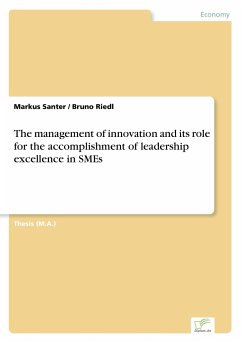Thesis (M.A.) from the year 2003 in the subject Business economics - Business Management, Corporate Governance, grade: 1,0, University of Innsbruck (Sozial- und Wirtschaftswissenschaftliche Fakultät), language: English, abstract: Inhaltsangabe:Zusammenfassung:
Die aktuelle Situation auf den Märkten ist gekennzeichnet durch Hyperwettbewerb, stark verkürzte Produktlebenszyklen, immer kürzere Produkt- und Technologieentwicklungszeiten. Daraus resultiert die zunehmende Notwendigkeit auch für KMUs, auf internationalen Märkten tätig zu sein und Kernkompetenzen global zu nutzen. Vorsprung zu haben vor anderen, vor Wettbewerbern ist zweifellos von Vorteil. Im Wettlauf um Kunden und überzeugte Anhänger gewinnt doch immer der, der besser, innovativer ist.
Erfolgreiches Innovationsmanagement ist eine wesentliche Voraussetzung für überdurchschnittliche Wertsteigerung des Unternehmens, höheres Wachstum im Vergleich zu Konkurrenzunternehmen, Kundenzufriedenheit und letztendlich somit auch eine Notwendigkeit zur Zufriedenstellung aller Stakeholder.
Die eingehende Auseinandersetzung mit sowohl theoretischen Grundlagen als auch praktisch angewandten Methoden des Innovationsmanagements bildet den Ausgangspunkt für unsere Diplomarbeit. Das Ziel unserer Arbeit ist es, einerseits theoretische Einblicke in neue Konzepte des Innovationsmanagements zu geben, und andererseits auch praktische Entscheidungshilfen für kleine und mittlere Unternehmen zur Verfügung zu stellen.
Abstract:
What are the main reasons for the fact that some companies are able to produce more innovative products and services of better quality in less time for their customers compared to their competitors in a given market? Which are the most important success factors and leadership implications that make some small and medium-sized firms more innovative and more successful than others? Those have been the underlying questions that guided us, when writing this paper on the management of innovation and its role for the accomplishment of leadership excellence in small- and medium-sized enterprises (SMEs). When searching the literature of the past five years one can find a vast amount of published articles and studies on innovation and the management of innovation but only a limited number of articles dealt with the specific situation and needs of SMEs. Thus we felt that it would be helpful for leaders of this type of companies to identify a set of practicable implications and measures to be taken in order to support and foster innovation. Of course we cannot reinvent the wheel by setting completely new rules of doing business in SMEs. But what we can do here is trying to identify relevant steps helping to support innovative activities and perhaps even more important to sharpen the leaders senses for the significance of innovation to their business success.
Inhaltsverzeichnis:Table of Contents:
I.INDEX OF TABLES AND FIGURES7
II.INDEX OF ABBREVIATIONS9
1.INTRODUCTION10
1.1Problem Formation10
1.2Goals of our work12
1.3Structure of our work14
1.4Subject of investigation: Small and Medium-Sized Enterprises17
1.4.1Overall situation of SMEs17
1.4.2Definition of SMEs17
1.4.3Characteristics of SMEs19
1.4.4Stakeholder management in SMEs20
1.4.5Innovation and core competences in SMEs23
2.DEFINING INNOVATION24
2.1A choice of different definitions of innovation used in recent literature24
2.2Defining innovation in the context of our work25
2.3Dimensions of Innovation25
2.3.1Product versus Process Innovation26
2.3.2Radical versus Incremental Innovation26
2.3.3Technological versus Administrative Innovation27
3.ANALYSIS OF THE EXTERNAL ENVIRONMENT OFINNOVATION28
3.1Impact of public authorities and political decisions on Innovation29
3.1.1Public Innovation Climate29
3.1.2Active p...
Hinweis: Dieser Artikel kann nur an eine deutsche Lieferadresse ausgeliefert werden.
Die aktuelle Situation auf den Märkten ist gekennzeichnet durch Hyperwettbewerb, stark verkürzte Produktlebenszyklen, immer kürzere Produkt- und Technologieentwicklungszeiten. Daraus resultiert die zunehmende Notwendigkeit auch für KMUs, auf internationalen Märkten tätig zu sein und Kernkompetenzen global zu nutzen. Vorsprung zu haben vor anderen, vor Wettbewerbern ist zweifellos von Vorteil. Im Wettlauf um Kunden und überzeugte Anhänger gewinnt doch immer der, der besser, innovativer ist.
Erfolgreiches Innovationsmanagement ist eine wesentliche Voraussetzung für überdurchschnittliche Wertsteigerung des Unternehmens, höheres Wachstum im Vergleich zu Konkurrenzunternehmen, Kundenzufriedenheit und letztendlich somit auch eine Notwendigkeit zur Zufriedenstellung aller Stakeholder.
Die eingehende Auseinandersetzung mit sowohl theoretischen Grundlagen als auch praktisch angewandten Methoden des Innovationsmanagements bildet den Ausgangspunkt für unsere Diplomarbeit. Das Ziel unserer Arbeit ist es, einerseits theoretische Einblicke in neue Konzepte des Innovationsmanagements zu geben, und andererseits auch praktische Entscheidungshilfen für kleine und mittlere Unternehmen zur Verfügung zu stellen.
Abstract:
What are the main reasons for the fact that some companies are able to produce more innovative products and services of better quality in less time for their customers compared to their competitors in a given market? Which are the most important success factors and leadership implications that make some small and medium-sized firms more innovative and more successful than others? Those have been the underlying questions that guided us, when writing this paper on the management of innovation and its role for the accomplishment of leadership excellence in small- and medium-sized enterprises (SMEs). When searching the literature of the past five years one can find a vast amount of published articles and studies on innovation and the management of innovation but only a limited number of articles dealt with the specific situation and needs of SMEs. Thus we felt that it would be helpful for leaders of this type of companies to identify a set of practicable implications and measures to be taken in order to support and foster innovation. Of course we cannot reinvent the wheel by setting completely new rules of doing business in SMEs. But what we can do here is trying to identify relevant steps helping to support innovative activities and perhaps even more important to sharpen the leaders senses for the significance of innovation to their business success.
Inhaltsverzeichnis:Table of Contents:
I.INDEX OF TABLES AND FIGURES7
II.INDEX OF ABBREVIATIONS9
1.INTRODUCTION10
1.1Problem Formation10
1.2Goals of our work12
1.3Structure of our work14
1.4Subject of investigation: Small and Medium-Sized Enterprises17
1.4.1Overall situation of SMEs17
1.4.2Definition of SMEs17
1.4.3Characteristics of SMEs19
1.4.4Stakeholder management in SMEs20
1.4.5Innovation and core competences in SMEs23
2.DEFINING INNOVATION24
2.1A choice of different definitions of innovation used in recent literature24
2.2Defining innovation in the context of our work25
2.3Dimensions of Innovation25
2.3.1Product versus Process Innovation26
2.3.2Radical versus Incremental Innovation26
2.3.3Technological versus Administrative Innovation27
3.ANALYSIS OF THE EXTERNAL ENVIRONMENT OFINNOVATION28
3.1Impact of public authorities and political decisions on Innovation29
3.1.1Public Innovation Climate29
3.1.2Active p...
Hinweis: Dieser Artikel kann nur an eine deutsche Lieferadresse ausgeliefert werden.








